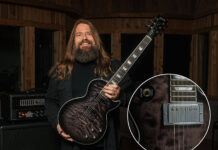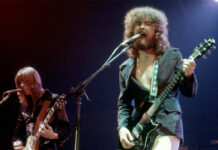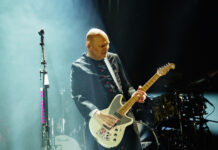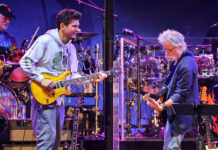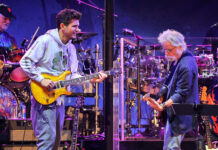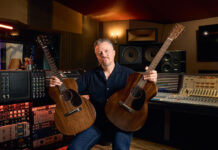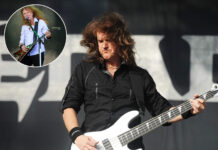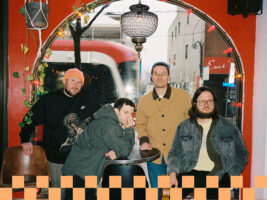
PUP guitarist Steve Sladkowski picks his favourite punk guitar innovators
PUP’s music inhabits a weird space. Their songs are fun – as evidenced by shows that are famously fun, all sweat and shouting and chaos – but their songs are not about having fun. Their new record Who Will Look After The Dogs?, for example, spends 30 minutes or so staring into the void left behind by a disruptive shift in life circumstances, and yet it’s so much fun. Beneath a mountain of chaotic riffs, earworm leads and barked choruses they crush tension, self-loathing and drama into a diamond.
READ MORE: Lamb Of God’s Mark Morton picks his favourite non-metal guitar players
It’s interesting to learn, though, that the Toronto pop-punks’ fifth album is actually the result of them relinquishing control for the first time while setting aside the perfectionism that’s threatened to eat them alive in the past. To an extent, this is what it looks like when PUP try to have fun in the studio. “There’s only so much relaxation that this band is capable of,” guitarist Steve Sladkowski admits. “I think the four of us just have a baseline neuroticism. Rather than fight against it, I think we just found ways to mitigate some of the most destructive elements.”
Who Will Look After The Dogs? was recorded across a three week session in Los Angeles with John Congleton, a producer with a starry rep for making pop records for insane people thanks to past work with everyone from St. Vincent to Mannequin Pussy. PUP’s existing work certainly runs in parallel to that ideal, with Sladkowski’s improv-inspired playing providing an antic edge as vocalist-guitarist Stefan Babcock empties his guts on repeat, but here they have upped the ante.
Each song, from the smashy anti-anthem No Hope to the waltzing melancholy of Hunger For Death, arrives decorated with in-your-face fuzz, needling drones and euphoric noise, the rhythm section of bassist Nestor Chumak and drummer Zack Mykula ducking and weaving. “Getting away from being too precious, with the timeline John suggested, was an interesting challenge for us,” Sladkowski says. “Not everyone takes the same challenge the same way in the band.”
Image: Martyna Wisniewska
“What John cares about is the art form,” he continues. “You could go into the Rick Rubin world where they’re there as a sort of vibe guardian, where they sit in the back and they’re not really doing a tonne of the technical act of making the record, but we realised very quickly that is not John. He was sitting at the computer, hitting record and trusting his taste. I think that is part of why it works the way it does. He would not let us overstep when he felt like we had a take. He was very good at being like, ‘We’re gonna keep moving.’”
Before heading to LA, Sladkowski did just enough planning, mapping things out in his mind and on a series of charts so that he’d be prepared to roll with the punches when it mattered. It’s an approach he refers to as ‘structure not dogma.’ “I had a pretty good working idea of signal paths, pedal chains and tones that I wanted, based on the demos we’d be doing,” he says. “I had a notebook where I was keeping a log of all of that. But if something needed to change – certain songs had much longer sections before John got hold of them – I wasn’t thrown off in such a way that I felt like I didn’t know what I could do.”
Gear-wise, this attitude carried over. For the first time, Sladkowski left the studio believing that he could have made the same record without bringing along a single piece of his own gear. He chiefly played a Thurston Moore signature Jazzmaster that was gifted to Congleton by the Sonic Youth icon himself. “He goes, ‘That’s the guitar Annie tried to buy off me,’” he recalls. “And you’re like, ‘Oh, right. St. Vincent, your friend, Annie.’ Come on, man, what are you doing to me here?”
“I did play my Tele, which is from the early 2000s and has a Bigsby,” he adds. “I’ve been playing it since I was in high school. I played a Gretsch Country Gentleman a bit, that’s from either the late ‘60s or early ‘70s. I used a Fender Deluxe or a Twin, and a Jazz Chorus. My tones tend to be the ones that are a little bit more affected – I always opt for headroom. If I’m using a combo, it’s got to be a loud Fender, something that will take pedals pretty well. I’m a big fan of the Boss RC-20XL to make drones. The stuff you hear in Concrete is all that. If we found an effects chain that was more ambient – John had a lot of Chase Bliss stuff – I would play a loop, he would take a minute of it, and I would leave it to him to put it wherever he thought it made sense.”
Scraping away some of these layers reveals Sladkowski’s work on Who Will Look After The Dogs? to be a thrilling example of what can be achieved in tight spaces when you’re willing to see constraint as a creative prompt. He is always on the brink of spiralling away into another realm before clinging on to the driving, faultlessly hooky heart of the songs – the outro solo on Cruel is a little marvel, all hairpin turns and dizzying flurries – and his list of favourite punk, or punk-adjacent, guitar players only reflects this aspect of his outlook.
“I love free improvisation, full avant garde,” he says. “The challenge, especially in those guitar breaks that lend themselves to freak outs, is marrying that mentality that I love about improv music with the parameters that the band sets. I think, in the past, I would bristle a little bit at that, and sometimes I still do. But one of the nice things about working with John was that very early on he and I realised we had the same favourite guitar player: Marc Ribot.”
So, without further ado…
Marc Ribot
“I can’t explain how life-affirming and creatively game-changing discovering Marc Ribot was for me. He was able to be in that crazy avant-garde noise, downtown New York CBGB scene alongside John Zorn and Television while also being the session player on Robert Plant and Alison Krauss records, or with Tom Waits and the Black Keys. Then he’s able to completely shapeshift again and be like, ‘I put out a record where I played the guitar with balloons.’ Finding a guy like that, who just wasn’t interested in being like I’m a jazz guy, or I’m a rock guy, was such an important thing.”
Nels Cline
“What was important [with discovering Nels Cline] was eighth notes and how you approach playing eighth notes in a situation that tells you you need to play eighth notes. He can be super jazzy. He can be super noisy. He can be very punk, right? He speaks openly about Tom Verlaine’s influence on him. Television, again. Tom Verlaine could be this whole list, I think, and people would know what you’re getting at. To play cool guitar solos in the past 25 years, and not feel like it’s cheap or corny or whatever, I think Nels Cline is a guy who lit that path in a modern way. Somebody has to do it for every generation and I think he is one of those for people in their mid-to-late 30s.”
Noël Akchoté
“This guy’s punk, but I wouldn’t say he’s punk in the way that PUP is punk. He’s been doing these really interesting DIY home-recorded releases. I think in 2022 or 2023 he put out like 20 – some of them were an hour, some of them were 20 minutes. He’s done all Erik Satie’s Gnossiennes and Gymnopédies and stuff. He’s done Albert Ayler. He’s done pop music. He’s done Louis Armstrong. The taste that he is displaying in this project is done in such a punk way, with absolutely zero respect for anything other than getting at what the essence of the music is. He’s fully like, ‘I don’t give a fuck about convention.’ That, to me, is one of the most punk things you can do.”
Sister Rosetta Tharpe
“She is someone I keep coming back to. Her playing is so beautiful. I think the life she led was very complicated and punk in a lot of ways. Hearing that distortion – I don’t know that I want to envision where guitar would have gone if she hadn’t influenced people like Chuck Berry. That’s a crazy ‘what if?’ for me. What if Chuck Berry doesn’t hear Sister Rosetta Tharpe’s distorted slide, weird gospel-blues, early rock and roll hybrid thing? I love the way she played with gender dynamics. Sometimes it’ll be her totally done up playing guitar, and it’s all just dudes in suits behind her. At that time, you would think that a woman would not be fronting a group of men, especially where religious or devotional music is concerned. She’s a fucking badass. She’s so good. I’ve been thinking a lot about her playing recently – there’s that uncompromising melodic approach, a dash of entertainment value, and it’s truly boundary-breaking.”
Mike Huguenor
“I think I gotta pick my friend Mike, from Jeff Rosenstock’s band. He was in Shinobu and Hard Girls, who we toured with a lot. He has such an intuitive way of playing the guitar. I love watching him play. I love the choices he makes. And obviously I get to talk to him about all this shit all the time, too. I think the first time we met was in 2015 or 2016 and one of the first people we bonded over was Albert Ayler, a free jazz saxophone player. I was like, ‘Oh, here’s my guy, this is my dude right here!’ He’s also very, very funny and so, so cool. I can’t imagine Jeff’s band without him and I think Hard Girls were such an underappreciated band.”
PUP’s Who Will Look After The Dogs? is out on 2 May through Rise/Little Dipper.
The post PUP guitarist Steve Sladkowski picks his favourite punk guitar innovators appeared first on Guitar.com | All Things Guitar.
Source: www.guitar-bass.net



